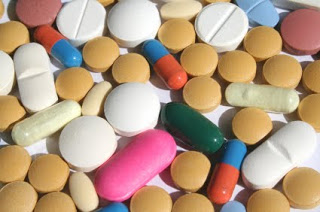I opened this week’s
JAMA Internal Medicine table of contents to find a short
editorial note that I would like to share. It’s written by Dr Michael Katz, in response to
this study by Zarel and colleagues, which reviewed dietary supplement recall data in the US over the last decade (sexual enhancement, body building, and weight loss products were amongst the high hitters on the recall list).
Dr Katz writes:
Americans spend over $20 billion annually on
dietary supplements. Although supplements
are regulated by the US Food and Drug
Administration (FDA) under the Dietary Supplement
Health and Education Act, there is no requirement for
supplement manufacturers to demonstrate efficacy or
safety of their products prior to marketing them. However,
companies may not include unapproved ingredients.
It turns out that even this minimal requirement
is not fulfilled. Harel et al identified 237 dietary
supplements that were recalled by the FDA owing to
inclusion of unapproved drug ingredients. Given the
limited regulation of these products, it is likely that
the number of recalls grossly underestimates the number
of products on sale with unapproved ingredients.
Dietary supplements should be treated with the same
rigor as pharmaceutical drugs and with the same goal:
to protect consumer health.
The mechanism by which the FDA identifies and recalls potentially dangerous dietary supplements is haphazard: either through spot inspection of manufacturing plants; tips from retailers; or reporting of adverse events by patients or physicians. The stringent regulatory process required for prescription medications to be approved is not in place for dietary supplements.
As the Zarel article writes:
To protect the health and
safety of the public, increased efforts are needed to regulate
this industry through more stringent enforcement
and a standard of regulation similar to that for pharmaceuticals.
Keeping the status quo may taint the dietary
supplement industry as a whole.
The bottom line: As it stands now, we cannot know if dietary supplements are safe.
Dr Sue Pedersen www.drsue.ca © 2013
Follow me on Twitter for daily tips! @drsuepedersen












